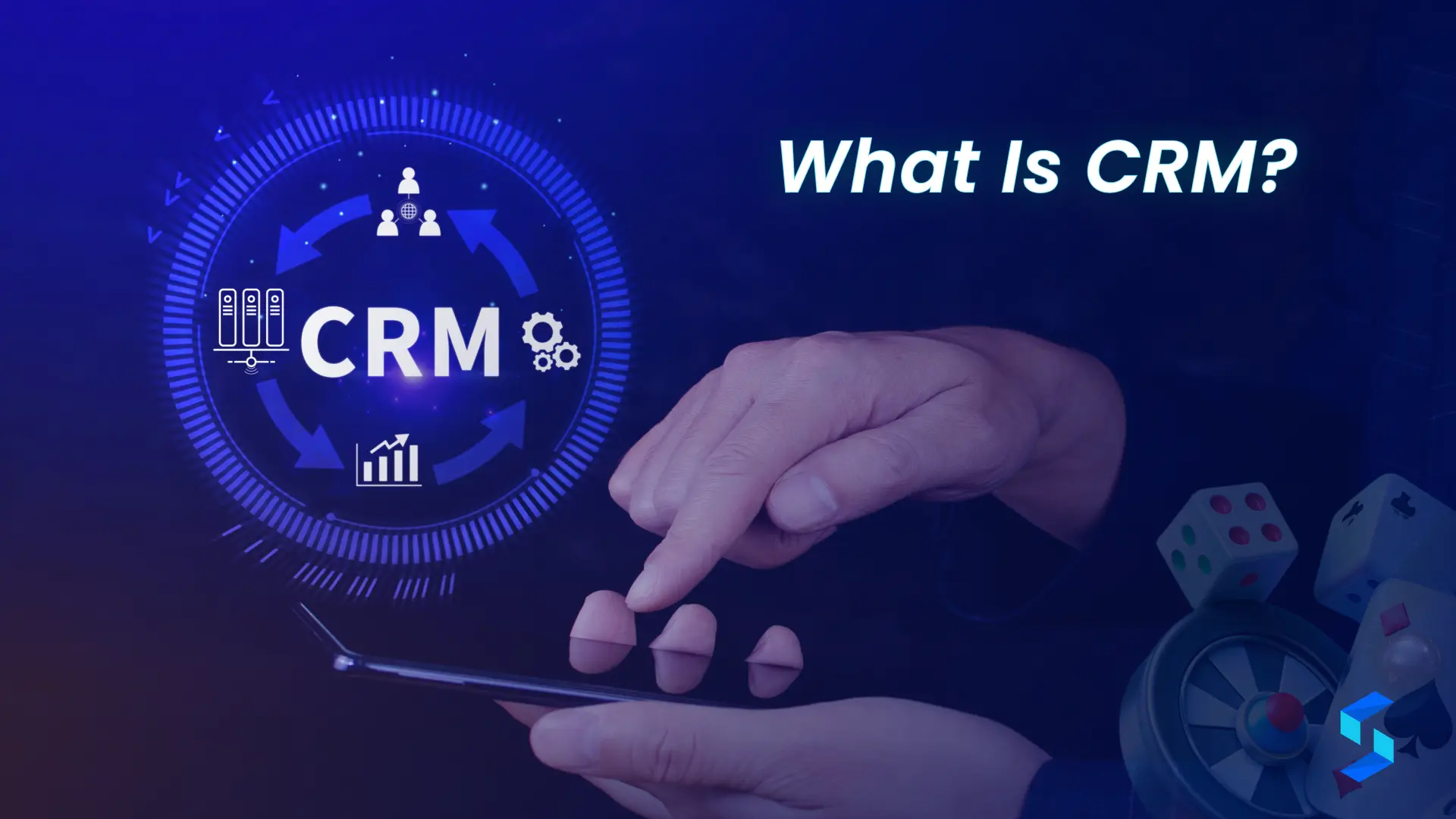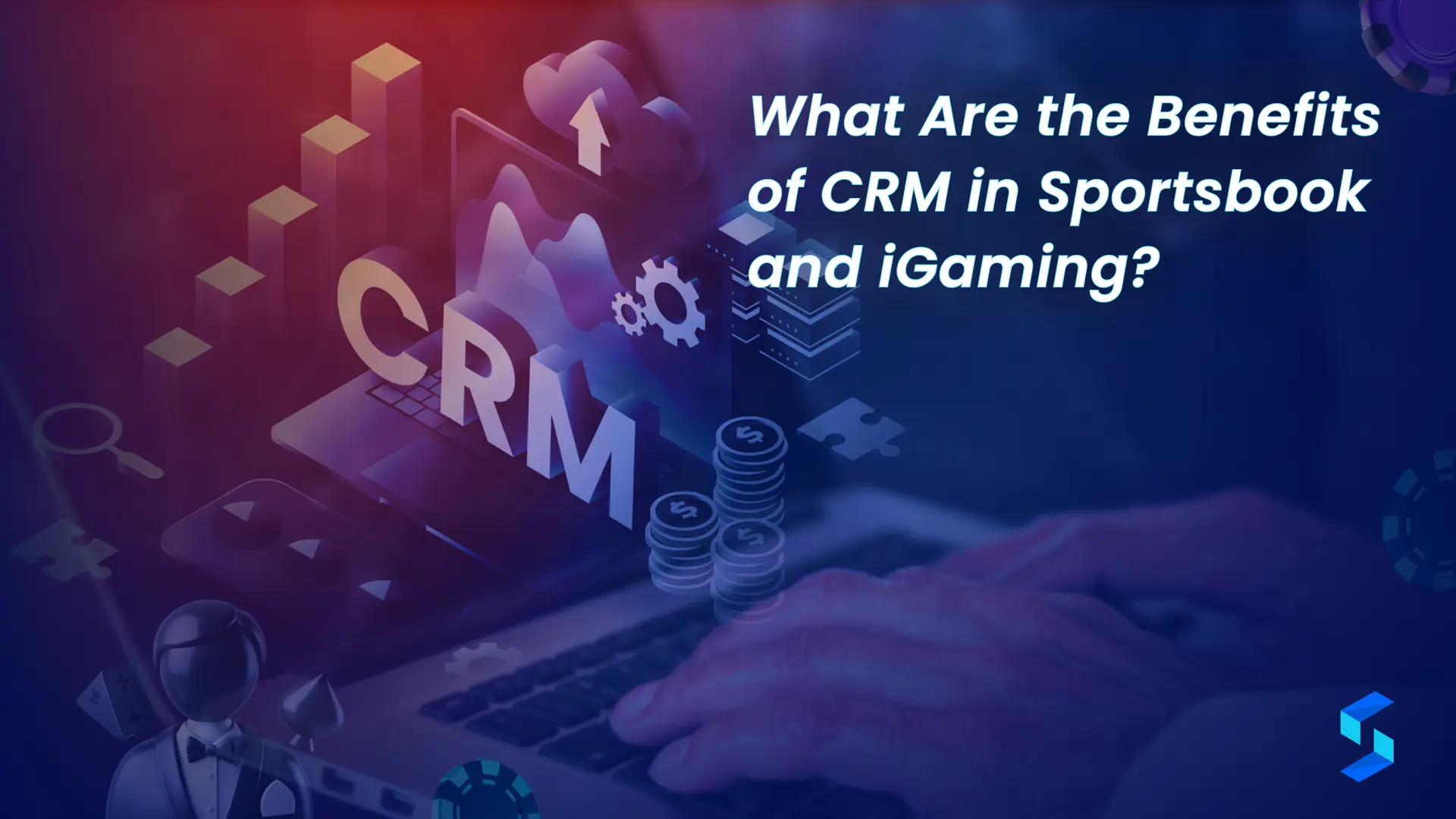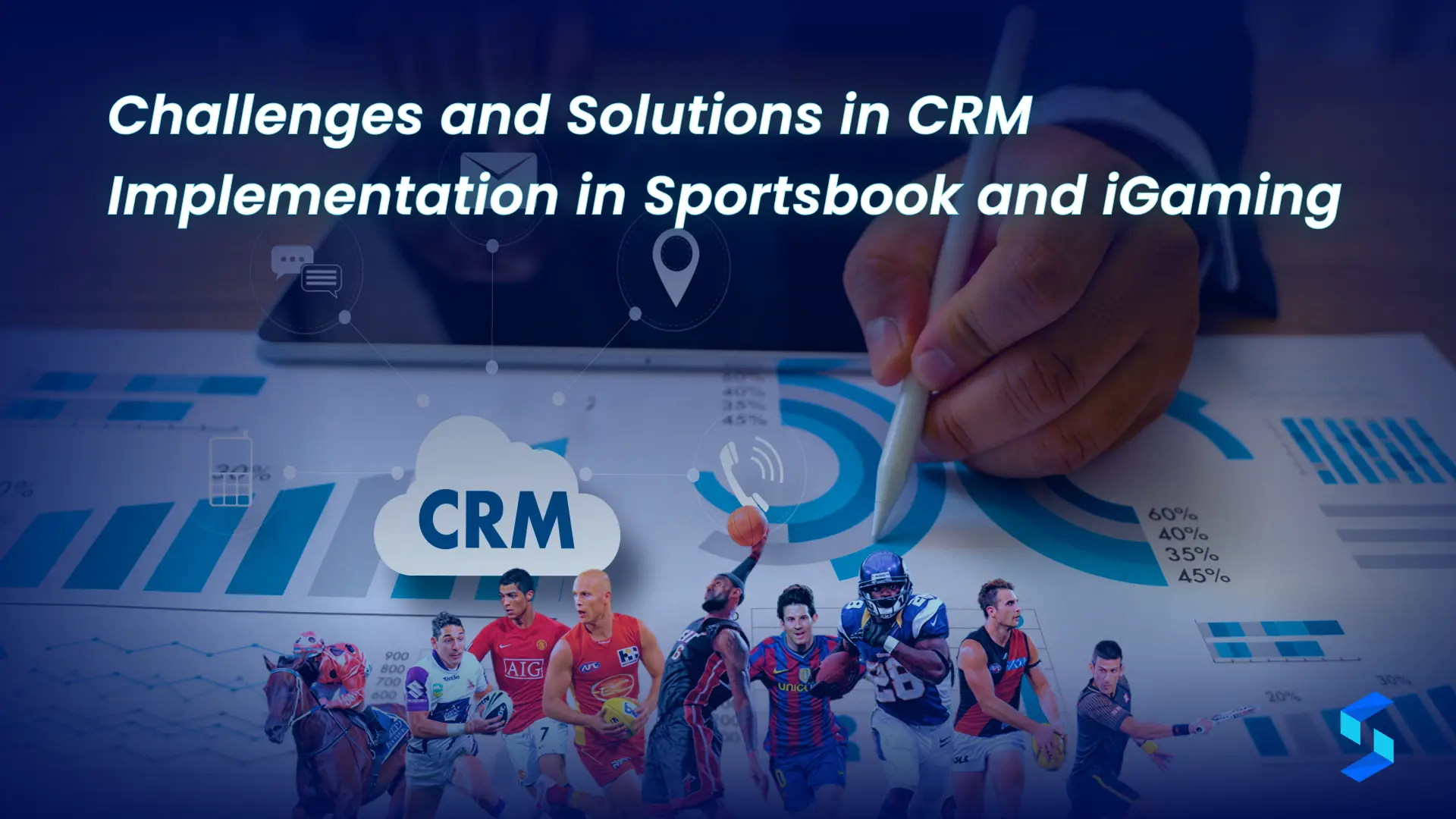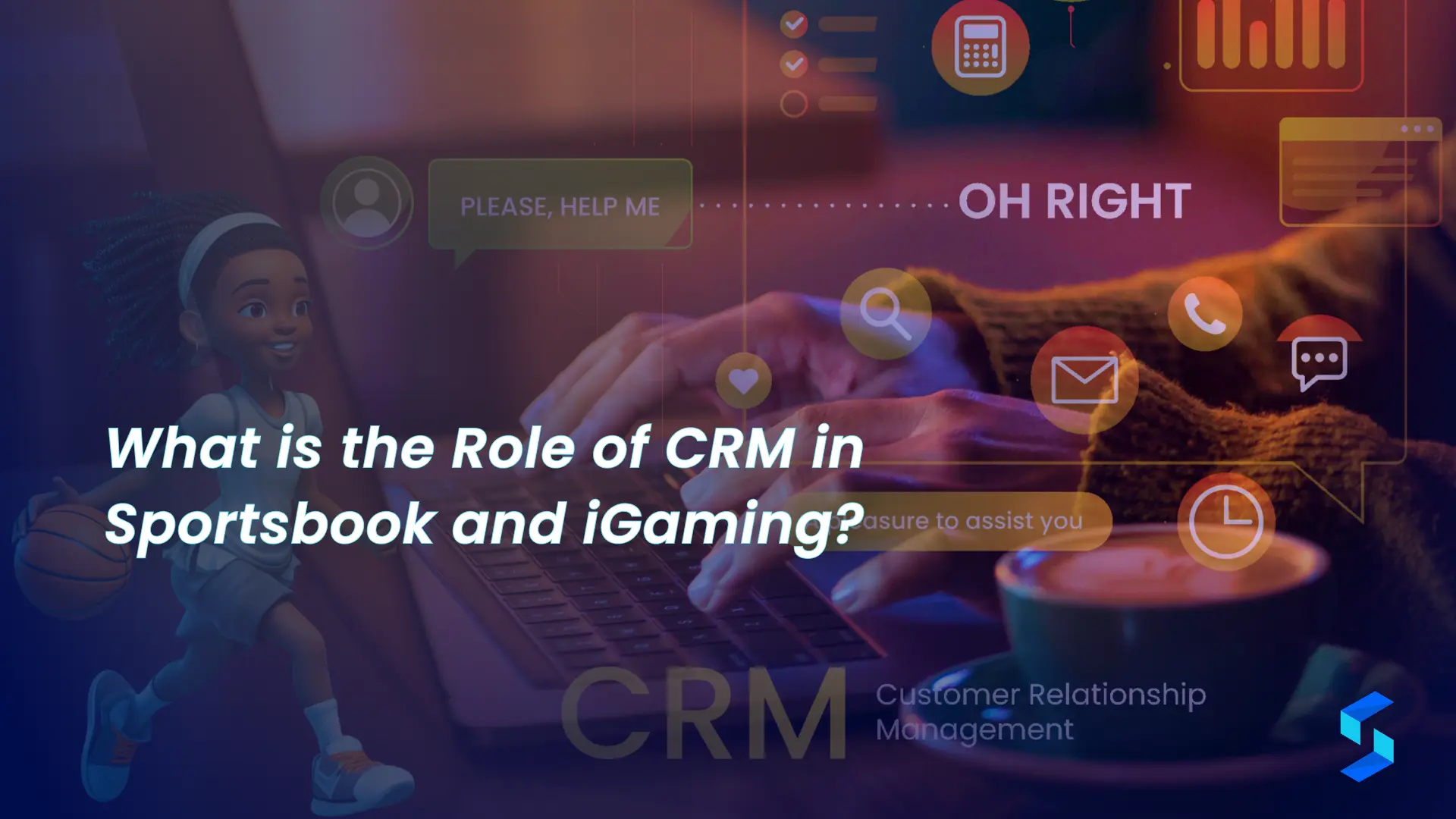Most operators chase short-term wins like bonus pushes, generic emails, and auto-replies, only to watch players disappear after a few rounds. Why? Because today’s bettors expect relevance and experience. That’s where a strong CRM makes the difference. In iGaming and sportsbooks, CRM is no longer just a back-end system. It’s a frontline tool for tracking behavior, tailoring outreach, and keeping players engaged beyond the first deposit.
The global CRM market is projected to hit USD 163.16 billion, growing at a CAGR of 14.6% from 2025 to 2030. Operators who invest in smarter engagement now are the ones who’ll stay competitive later.
Let’s cut through the fluff and focus on how CRM actually works in a sportsbook.
What Is CRM?

CRM, or Customer Relationship Management, is more than a contact database. In the sportsbook and iGaming space, it’s a powerful system that centralizes player data, automates communication, and drives retention through personalized engagement.
It helps operators deliver the right message at the right time based on real-time behavior.
Key CRM Features for Sportsbook and iGaming:
- Contact management and workflow automation
- Custom player segmentation and multi-brand support
- Sportsbook-specific tracking (bets, odds, risk ratings)
- Multi-channel customer support integration
- Secure data handling and compliance (e.g., GDPR)
- Real-time analytics and reporting
- Predictive modeling for churn and lifetime value
- Payment and transaction monitoring integration.
At Source Code Lab, we harness cutting-edge technology to redefine the iGaming experience. Our platforms feature AI-driven personalization, secure fraud detection, and immersive VR and AR gameplay. We also support crypto payments and NFTs, offering next-generation features that appeal to modern players and help keep your platform ahead of the curve.
Also Read: Essential Features of Modern iGaming Dashboards
What Are the Benefits of CRM in Sportsbook and iGaming?

A Customer Relationship Management (CRM) system is no longer optional in the highly competitive world of sportsbooks and iGaming.
As the industry becomes more data-driven and customer-focused, operators need smarter tools to attract, engage, and retain users. Here’s how a CRM system adds value throughout the player lifecycle:
1. Improved Player Segmentation:
CRM systems help operators segment their user base based on behavior, preferences, location, and betting history. This enables highly targeted campaigns that align with each player’s interests, increasing engagement and conversion rates.
For example: An online casino notices a segment of players who frequently play slot games in the evening, mostly from Canada, and prefer fantasy-themed titles like Book of Dead or Gonzo’s Quest.
Using CRM, the operator creates a targeted campaign offering free spins on new fantasy-themed slots between 6 PM and 10 PM local time. The message is delivered via email and in-app notification right before peak activity. Because the offer matches player habits and timing, engagement and conversion rates see a measurable boost.
2. Personalized Marketing Campaigns:
Personalization plays a critical role in retaining users. With CRM data, operators can automate and deliver custom promotions, tailored bonuses, and relevant content at the right time. These campaigns are triggered by real user activity, such as deposits, bets, or time spent on the platform.
For example, if a player consistently bets on English Premier League matches every weekend, the CRM can identify this pattern and automatically send them a special EPL-focused promotion every Friday, such as a boosted odds offer or free bet for Saturday fixtures.
This kind of timely, relevant outreach increases engagement, keeps the player active, and makes them feel understood, not just marketed to.
3. Enhanced Player Retention:
In an iGaming platform, CRM tools monitor player activity and spot those who haven’t logged in or placed bets for several weeks.
For example, if a casual slots player suddenly stops playing, the CRM flags them as at risk of churning. The operator can then trigger a targeted campaign, such as offering free spins, personalized game recommendations, or a loyalty bonus to re-engage the player.
By delivering timely and relevant offers based on individual behavior, the CRM helps turn occasional players into loyal, long-term users, thereby increasing retention and lifetime value.
4. Real-Time Communication:
Modern CRM platforms support instant communication through email, SMS, push notifications, and in-app messages. Operators can engage users in real time based on their actions.
For example, A player finishes a long blackjack session without placing another bet. The CRM instantly triggers a push notification offering a free spin or a cashback bonus to keep them engaged.
If they ignore it, a follow-up email with a personalized offer goes out later that evening. If they return and deposit again, the system logs the response and adjusts future campaigns accordingly.
5. Data-Driven Decision Making:
CRM platforms centralize player data, providing clear insights into user behavior, campaign performance, and overall trends.
For example, suppose data shows that a surge of players drops off after trying a particular slot game. In that case, operators can investigate whether the game’s volatility is too high, the bonus mechanics are unclear, or if the tutorial is lacking.
Based on these insights, the marketing team might adjust promotions to highlight more engaging games, the product team might improve onboarding for new titles, and support can proactively assist players who appear frustrated, all driven by CRM data.
6. Automated Workflows:
CRM systems automate tasks like welcome messages, deposit reminders, and win-back offers. For example, suppose a new player signs up and plays a few rounds on a slot game without making a deposit. In that case, the CRM can automatically trigger a personalized email offering a free spins bonus to encourage their first deposit.
If they deposit but go inactive for a few days, the system can send a reminder or exclusive offer tailored to the games they liked.
This automation reduces manual effort, avoids delays, and ensures players get relevant, timely communication that keeps them engaged.
7. Regulatory Compliance:
CRM tools help operators maintain detailed records of customer interactions and communication preferences. For example, if a player in the EU sets deposit limits for responsible gambling, the CRM logs this preference and ensures all future bonus offers respect that limit.
It also tracks whether the player has opted out of marketing emails, helping operators stay compliant with GDPR and local gaming regulations. This protects both the player and the business while reinforcing trust and transparency.
8. Upselling and Cross-Selling Opportunities:
CRM insights enable strategic upselling and cross-selling. For example, sportsbook users can be introduced to casino games based on their interests, and regular players can be encouraged to try premium features or higher-stakes options.
9. Stronger Customer Support:
With a centralized CRM, support teams can access complete customer histories. For example, if a player contacts support about a missing free spin bonus on a slot game, the agent can instantly view their recent gameplay, bonus eligibility, and past interactions.
Instead of escalating the issue or asking repetitive questions, the agent can resolve it quickly by offering a relevant update or reissuing the bonus on the spot. This speed and personalization improve the player’s experience and build long-term trust.
10. Competitive Advantage:
A well-executed CRM strategy helps sportsbooks and iGaming operators stand out in a crowded market. It builds trust, enhances customer lifetime value, and boosts the return on marketing investment.
For example, imagine an online casino notices that a player frequently plays high-stakes slots on Friday nights. The CRM logs this pattern and automatically triggers a personalized message every Friday afternoon, offering free spins on their favorite slot game.
If the player doesn’t log in for two weeks, the CRM sends a reactivation offer, such as a deposit match or an exclusive bonus, to encourage them to return.
You Might Also Like: Get Your Own Casino & Sportsbook Platform With Source Code Lab
How To Choose the Best-Fit CRM for Sportsbook?
Choosing the right Customer Relationship Management (CRM) system is crucial for sportsbook operators aiming to enhance player engagement, boost retention, and maximize revenue.
Given the competitive nature of the sportsbook industry, a tailored CRM can provide the edge you need by delivering personalized marketing, smooth user management, and strong analytics.
Here’s how to identify the best-fit CRM for your sportsbook business:
1. Understand Your Business Needs and Goals
Before exploring CRM options, clearly define what you want the system to accomplish.
- Identify whether your focus is acquisition, retention, or reactivation
- Clarify which player segments you want to target and how
- Define key metrics you want to improve, such as deposit frequency or churn rate
- Decide if you need multi-brand support, real-time tracking, or advanced compliance tools
2. Ensure Industry-Specific Features
Sportsbook operations have unique requirements such as:
- Track live betting activity, player preferences, and transaction history in real time
- Integrate seamlessly with odds feeds, risk management tools, and game providers
- Support multi-jurisdiction compliance, including KYC, AML, and self-exclusion
- Enable segmentation by sport, betting behavior, and engagement level
3. Prioritize Data Integration Capabilities
Your CRM should smoothly:
- Sync player bets, deposits, and withdrawals across systems in real time
- Connect with KYC providers and fraud detection tools for better compliance
- Enable automated, data-driven campaigns based on live player behavior
- Reduce manual work by unifying data from multiple platforms into one dashboard
4. Look for Advanced Segmentation and Personalization Tools
Effective player engagement depends on targeted communication.
- Segment players by bet size, game type, location, device, and activity status
- Set automated triggers for real-time messages based on player behavior
- Personalize offers and promotions based on individual preferences and past actions
- Deliver campaigns across channels like email, SMS, push, and in-app messaging
5. Evaluate Automation and Workflow Features
Automation reduces manual effort and increases responsiveness. Choose a CRM with:
- Trigger welcome bonuses instantly after sign-up or first deposit
- Send reactivation offers based on inactivity duration or missed milestones
- Automate KYC reminders and compliance checks based on account status
- Create custom sequences for VIPs, casual players, or high-risk segments
6. Check Reporting and Analytics Capabilities
A powerful CRM:
- Tracks key metrics like player lifetime value, churn rates, and campaign ROI
- Accesses real-time data to adjust marketing efforts on the fly
- Uses customizable dashboards to monitor player behavior and engagement
- Identifies trends and segment performance to refine targeting strategies
7. Assess Compliance and Security Standards
The sportsbook industry is heavily regulated. Your CRM must:
- Ensure the CRM complies with GDPR, ISO 27001, and local gaming regulations.
- Look for features like encryption, two-factor authentication, and role-based access control.
- Verify support for responsible gaming tools such as self-exclusion and activity monitoring.
- Confirm the system maintains detailed audit logs for all player interactions and data access.
8. Consider Scalability and Flexibility
As your sportsbook grows, your CRM should adapt without major disruptions.
- Choose a CRM that supports high player volumes and concurrent activity without performance issues
- Ensure the system can integrate with new payment providers, games, or regional regulations as you expand
- Opt for platforms that let you modify segmentation, triggers, and messaging without relying heavily on developers
- Look for multi-brand and multi-language support to streamline operations across different regions
9. Evaluate Vendor Support and Reputation
Reliable customer support can make or break your CRM experience.
- Look for vendors with experience in sportsbook and iGaming CRM deployments
- Check client testimonials and case studies for real-world performance
- Prioritize fast, knowledgeable technical support with 24/7 availability
- Opt for platforms that offer onboarding, training, and continuous guidance
With a presence in over 40 countries and an experienced team, Source Code Lab combines global reach with personalized service. We understand regional market needs and tailor solutions accordingly. Our 24/7 support ensures clients get timely help, building partnerships based on trust and success. Choosing Source Code Lab means gaining a dedicated ally in your gaming venture.
10. Test with a Trial or Pilot Program
Before committing, request a trial period or pilot implementation.
- Ask the vendor for a sandbox or demo environment to test core CRM functions
- Simulate real player journeys to evaluate personalization and automation
- Monitor how well the CRM integrates with your existing tech stack
- Collect input from cross-functional teams to identify gaps or friction points
Selecting the best-fit CRM for your sportsbook is a strategic decision that drives player satisfaction and business growth. By focusing on sportsbook-specific features, smooth integration, automation, and compliance, you ensure the CRM empowers your team to deliver superior customer experiences and stay ahead in a competitive market.
Suggested Read: Understanding What is iGaming
Challenges and Solutions in CRM Implementation in Sportsbook and iGaming

Implementing a Customer Relationship Management (CRM) system in the sportsbook and iGaming industry isn’t just a technical task. It’s a strategic initiative that directly impacts customer acquisition, retention, and lifetime value.
However, the unique dynamics of the betting and gaming landscape introduce specific challenges that must be addressed to ensure a CRM platform performs effectively. Below are the key challenges operators face and the strategies to overcome them.
| Challenge | Solution |
| Fragmented data across systems | Integrate CRM with all key platforms to build a unified player profile |
| Compliance and data privacy | Use CRM with built-in security, consent tracking, and regional compliance support |
| Scaling personalization | Use AI-driven CRM for automated segmentation and dynamic content |
| Delayed campaign execution | Choose event-based CRM with real-time triggers and fast processing |
| Weak retention and re-engagement | Set up automated rewards, win-back flows, and loyalty programs |
| Inconsistent cross-channel messaging | Centralize communication and manage all channels from one CRM dashboard |
| Team resistance to adoption | Pick easy-to-use CRM, offer training, and link usage to performance KPIs |
Conclusion
CRM is now a key driver of engagement, retention, and revenue, not just a back-office tool. In 2025, sportsbooks that don’t integrate CRM into daily operations will fall behind competitors who use it for informed, timely decisions.
Modern CRMs help operators analyze player behavior, automate outreach, and manage risk better.
As the iGaming market matures, CRM will increasingly predict churn and enable targeted offers. Treating CRM as a strategic asset, rather than just a support tool, will position operators for sustainable growth and a competitive edge.
Struggling to keep players engaged after their first deposit? Sending the same promotions to every user with little impact?
Not sure how to track player behavior across platforms?
At Source Code Lab, we understand these challenges. That’s why we help operators implement advanced CRM solutions through our customizable, ready-to-launch iGaming platforms. Our technology combines player management, real-time analytics, and personalized marketing tools to enhance retention and drive revenue.
Why Choose Source Code Lab?
- Over 5 Years of iGaming Development Experience
- Fully Customizable CRM Integrated Platforms
- Scalable Solutions for Global Markets
- Smooth Third-Party Integrations and Secure Payment Systems
- 24/7 Multilingual Support
Get a consultation today and build your sportsbook on a foundation that puts CRM and player success at the core.


